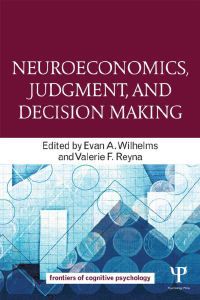 By Karene Booker
By Karene Booker
Reprinted from Cornell Chronicle, July 17, 2014
Valerie Reyna, professor of human development in Cornell’s College of Human Ecology, and graduate student Evan Wilhelms are editors of a new book: “Neuroeconomics, Judgment and Decision Making” (Taylor & Francis).
Drawing on perspectives from the early roots of psychology through the latest neuroscience, the book introduces what we know about how and why people make decisions with economic consequences (e.g., saving money, donating to charity, choosing medical treatment). The volume, written by leading neuroeconomists, neuroscientists and social scientists, answers broad questions about the ways developmental, neurological and individual differences influence our choices; whether deciding quickly is good or bad; whether emotional reactions lead us astray or help; how decision processes change over the lifespan; and the nature of expertise.
“Ours is one of the few books on neuroeconomics, the relatively new field that looks at the biological origins of economic decisions and economic behavior in the brain,” says Reyna.
“The cutting-edge research featured in the book holds promise for improving practice in law, management, marketing, computer science and health care,” she says.
“Understanding how people process numerical information about risks and then make decisions based on this information, for example, will boost efforts to help patients make informed health care decisions and freely decide between treatment options,” she explains.
Reyna and her research team contributed two chapters, combining recent discoveries in neuroscience with Reyna’s “fuzzy-trace theory,” which proposes people represent information both as bottom-line gist meaning and as literal facts, but tend to rely on the simplest gist necessary when making decisions. They show that this reliance on gist representations is beneficial for making choices, helping people accurately predict how they will feel in the future about the outcomes of various decisions. Their next chapter discusses the processes underlying inconsistent or so-called “irrational” choices and sheds light on ways of improving judgments and decisions.
The book is an introduction to decision-making intended for researchers, students and professionals in the fields of neuroscience, psychology, economics, business and public health. Preparation of the book was supported in part by the National Institutes of Health, National Cancer Institute and National Institute of Nursing Research.
Karene Booker is an extension support specialist in the Department of Human Development.
Related Links:
College of Human Ecology
Valerie Reyna
The book

